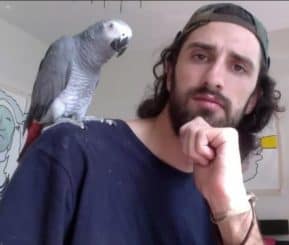
![]() “Just look at you. How can you have any credibility in talking about millennials? You’d better bring your son Alex with you when you speak to my staff.” Tom Scott, CEO and chairman of The Nantucket Project, challenged me with this comment. The Nantucket Project is one of the leading intellectual leadership forums in America. I took Tom’s suggestion seriously.
“Just look at you. How can you have any credibility in talking about millennials? You’d better bring your son Alex with you when you speak to my staff.” Tom Scott, CEO and chairman of The Nantucket Project, challenged me with this comment. The Nantucket Project is one of the leading intellectual leadership forums in America. I took Tom’s suggestion seriously.
Of course, he was right. How can a pipe-smoking grandfather traditionalist be an authentic champion of the emerging millennial mindset? It was time to call my son for help.
“Dad, I’d be happy to come,” responded Alex, “but if you’re going to have any credibility in my world you need to come to New York and give your presentation to my friends—many of whom, as you know, are artist activists involved with Black Lives Matter.” We scheduled a time to gather in an art studio in Chelsea over pizza and beer. I took off my tie and donned a black outfit. It was the best I could do.
How can a pipe-smoking grandfather traditionalist be an authentic champion of the emerging millennial mindset?
Gathered in a small gallery in a circle of chairs were a diverse group of millennials: high school teachers, artists, gallery owners, designers, fashion models, bartenders, UN staffers, and an older member of the Communist party. Jackson Pollock-like abstractions hung on the wall in anticipation of a forthcoming gallery opening. It was as authentic as New York City can offer. In their diversity, this group of millennials shared a common desire to make the world a better place. All had been hassled by the NYPD, some had even been arrested, some were on the NYPD “watch list.” They were all passionate idealists marked by some visible scars of reality.
I began, “I’m pissed off by the way my children and their friends are being put down by the media. I know for certain that just about everything said about millennials is wrong.”
In fact, researchers have found that millennials are a most derided generation. The top three characteristics assigned to the cohort are tech-savvy (54%), materialistic (45%), and selfish (39%). Ironically, millennials say almost the same things about themselves, meaning they have drunk the same negative media-generated Kool-Aid. Whatever your focus, we need to ignore the myths and memes and start engaging with real millennials. Alex had given me this opportunity.
I went on, “I’m not a wealthy man, and when I die I will not leave very much money for my children. But I will spend my remaining twenty years, God willing, defending the contribution millennials are making to society. And I will help bridge the gap between them and people my age. This will be my legacy to my three millennial children: to listen to them, empower them, and celebrate their emerging mindset.
“You are here today at the invitation of Alex to act as my collaborators. Does what I have to say about millennials ring true to your experience? I’m counting on you to tell me where I’m wrong,” I continued. “My thesis is that you are the first post-Enlightenment and post-secular generation. As such you are developing an entirely new social imaginary that will fundamentally change our understanding of human society. It is my contention that you not only think different, but think better. It is my goal to champion this new perspective, which I describe as the New Copernican ethos—explorers of a new mindset on relationships and reality.”
It was less a presentation as a free exchange of ideas—a cross-generational search for common ground and mutual understanding. It ended by someone asking, “Can we meet with you every month?”
I’ve been back repeatedly to learn from my new millennial mentors. Millennials do not need mentors as much as they need to be accepted as our mentors. Big corporations are doing “reverse mentoring;” it is high time the church did as well.
John Seel is a consultant, writer, cultural analyst, and cultural renewal entrepreneur. He is the founder of John Seel Consulting LLC, a social impact consulting firm working with people and projects that foster human flourishing and the common good. The former director of cultural engagement at the John Templeton Foundation, he is a national expert on millennials and the New Copernicans. He has an M.Div. from Covenant Theological Seminary and a Ph.D. in American Studies from the University of Maryland (College Park). He and his wife, Kathryn, live in Lafayette Hill, PA. He directs the New Copernican Empowerment Dialogues at The Sider Center at Eastern University. This post originally appeared on his blog, New Copernican Conversations.


